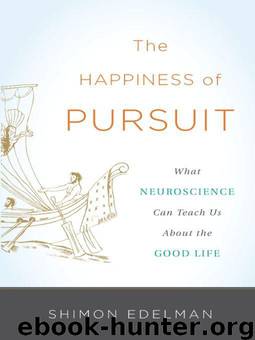The Happiness of Pursuit: What Neuroscience Can Teach Us About the Good Life by Edelman Shimon

Author:Edelman, Shimon [Edelman, Shimon]
Language: eng
Format: epub
ISBN: 9780465029204
Publisher: Basic Books
Published: 2012-01-30T22:00:00+00:00
By approximating the acoustic speech stream, which is analog (in the sense of Chapter 2), with text, which is digital, this example focuses on how a learner can bootstrap from knowledge of the basic categorical elements of language (phonemes, represented here by letters) to the discovery of words (statistically prominent sequences of phonemes) and other, more complex constructions. As noted earlier, all it takes is for the learner to align and compare the stream of data to shifted versions of itself. This task requires memory for temporarily holding data and a mechanism for matching the held data to incoming sequences, both very straightforward functions that can be performed by rather simple neural circuits.
If you scan the Greek text for places where it matches shifted versions of itself, you will indeed discover sequences of characters that appear more than once. One such sequence is αὶ, which happens to be the Greek for “and” (see if you can find any others). Of course, a baby learning Greek has no access to such privileged information and so must rely on a statistical significance test to decide whether to admit αὶ into its lexicon or discard it as a fluke.
A partial rather than perfect match between two sequences that is nevertheless statistically reliable signifies a construction with a slot, in which some variation is to be expected. In the present example, the last two lines end, respectively, with the sequences ἤματαπάντα and ἦμαρἰδέσϑαι. Guessing that πάντα and ἰδέσϑαι are words in their own right because they appear elsewhere in the passage (indeed, these are the words for “all” and “to see”), we are led to conclude that ἤματα matches ἦμαρ. A Greek scholar will tell you that these strings are in fact related by inflection: they are the plural and the singular, respectively, of the word for “day.”30
The computational scheme for learning language that I have outlined over the last few pages provides for all the necessary functional components of this monumental task. Controlled experiments in language acquisition show that babies indeed solve it by leveraging a few strategic assumptions about the nature of the data they face and by applying statistical inference to the problems of reference determination and structure discovery.31 The recipe for learning language seems to boil down to this, then: scan the speech you hear for recurring structures while monitoring its situational context, note statistically significant matches within the speech stream as well as between speech and the outside world, feed what you already know back into the discovery machine, and soon enough it will not be Greek to you anymore.
A great thing about this scheme is that it is perfectly suitable for complete novices: you don’t have to know anything specific about the language you are immersed in before you start. Beyond that, it only gets better: the farther along you are, and the more words and other constructions you already know, the more good candidates for further analysis suggest themselves. Knowing more also helps you make use of
Download
This site does not store any files on its server. We only index and link to content provided by other sites. Please contact the content providers to delete copyright contents if any and email us, we'll remove relevant links or contents immediately.
The Art of Thinking Clearly by Rolf Dobelli(10455)
The 5 Love Languages: The Secret to Love That Lasts by Gary Chapman(9792)
Mindhunter: Inside the FBI's Elite Serial Crime Unit by John E. Douglas & Mark Olshaker(9324)
Becoming Supernatural by Dr. Joe Dispenza(8204)
Nudge - Improving Decisions about Health, Wealth, and Happiness by Thaler Sunstein(7694)
The Road Less Traveled by M. Scott Peck(7594)
Mastermind: How to Think Like Sherlock Holmes by Maria Konnikova(7323)
Enlightenment Now: The Case for Reason, Science, Humanism, and Progress by Steven Pinker(7306)
Win Bigly by Scott Adams(7184)
The Way of Zen by Alan W. Watts(6601)
Factfulness: Ten Reasons We're Wrong About the World – and Why Things Are Better Than You Think by Hans Rosling(4737)
The State of Affairs by Esther Perel(4712)
Gerald's Game by Stephen King(4642)
Man's Search for Meaning by Viktor Frankl(4585)
The Confidence Code by Katty Kay(4251)
Thinking in Bets by Annie Duke(4218)
The Healing Self by Deepak Chopra(3568)
Hidden Persuasion: 33 psychological influence techniques in advertising by Marc Andrews & Matthijs van Leeuwen & Rick van Baaren(3559)
The Worm at the Core by Sheldon Solomon(3486)
